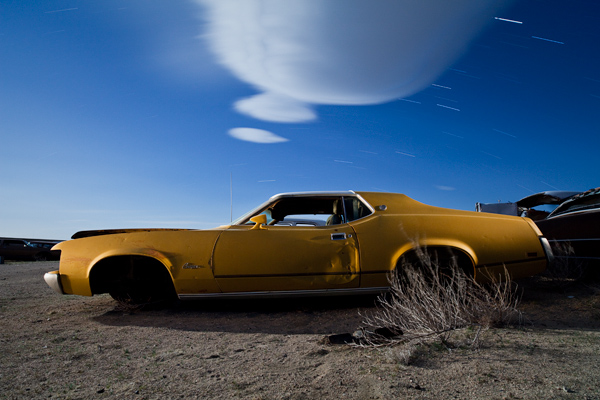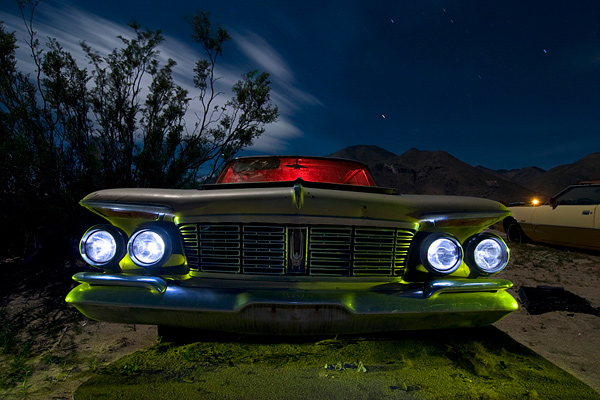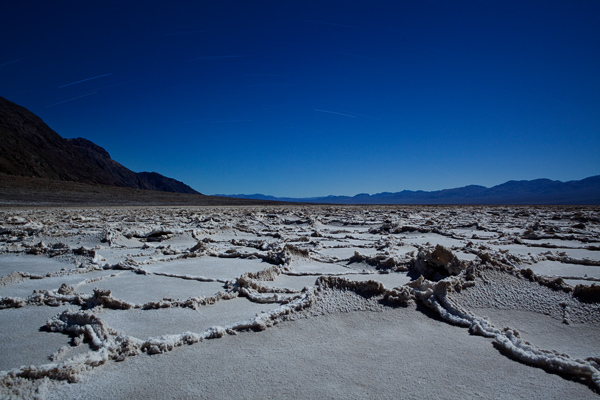By Joe Reifer
A life of photography has peaks and valleys. And then there are the plateaus. Sometimes moving into the next phase of your photography can involve a lot of time on the plateau. Over the last 10 years, I've found that workshops are a great opportunity to have a peak experience that can move your photography to the next level.
Photography workshops can be anything from an afternoon lecture to a safari half way around the world. I'm going to relate a short personal history of taking and teaching three to six day location workshops as a way to suggest how you can get the most out of your future workshop experiences.
You may or may not come home with great pictures, but if you choose your workshops wisely, you will hopefully have an experience that will help you make many great pictures in the future.
Somewhere you want to go
The first question a lot of photographers ask themselves when planning to take a workshop is, where do I want to go? With the abundance of photography workshop options available, choosing a few locations that you've always wanted to visit can be a great way to narrow down the choices.
Five years ago my Dad and I did a week-long workshop in Death Valley with Craig Tanner. I had just started photographing in the Mojave Desert quite a bit, and was due for a return visit to Death Valley. Of course we could have just grabbed a map and hopped in the car and photographed this area without taking a workshop.
But when you have limited time away from your job, having someone who is intimately familiar with a location to take you to the right spots during the right light is invaluable. The workshop was in a shoot-and-critique format, and the critiques were supportive and thought-provoking.
I returned from the workshop invigorated and inspired. I returned to photograph in Death Valley area three times over the next four years, including a night photography workshop where I was a guest instructor.
My original thought was to just revisit and photograph in a cool location. Little did I know that five years later I'd be leading a group of intrepid photographers out onto the salt flats of Badwater under a full moon at 2 a.m. on Halloween.
Something you want to learn
Learning a tangible skill from workshops is another great reason to get motivated. From lighting techniques to Photoshop, workshops are a great opportunity for skill building. Unlike spending a couple hours a week on photography with the rest of life's demands competing, I've found that total immersion in photography for a week can allow the level of concentration and focus needed to really push through to the next level.
About 6–7 years ago I was working really hard on my lighting skills. I was shooting with small flashes on location, and practicing studio lighting skills. I went to some local classes and meetups. I rented a pinball museum for an afternoon and did a fashion shoot with models, hair and makeup. Eventually I reached a plateau and it was time for a workshop. I did a week-long location lighting workshop with Joe McNally that ended up being a quantum leap for me. We worked 10+ hours a day lighting people at different locations each day. The workshop was a huge breakthrough in my skills and confidence level—I walked in a little bit timid, and came out with a swagger. That's the power of a lot of hard work, and a great workshop instructor.
Someone you want to learn from
Just because you can't put your finger on a specific technique you want to learn doesn't mean you shouldn't take a workshop. If you find yourself on a plateau as far as your inspiration goes, sometimes a workshop can be just the thing. When your goals are more inspirational than technical, the choice of instructor makes even more of a difference.
Talk to friends who've taken workshops for recommendations. Check the web pages of your favorite photographers to see if they teach workshops.

When I first became interested in long exposure night photography, all roads pointed to the Nocturnes in San Francisco. After a one-night workshop I was hooked. I stayed in touch with Tim Baskerville of the Nocturnes, who knows more about the history of night photography than anyone I've met.
As I became a more experienced night shooter, I started helping with the digital camera setup and post-processing portion of a few Nocturnes workshops. I have a background in teaching technology in a corporate setting, so teaching camera skills and Photoshop was a natural transition.
Pay it forward
In 2008 I discussed the possibility of teaching a night photography workshop with my friend Troy Paiva, who is well known in the world of urban exploration and night photography. He has a large fan base, with two books published, and numerous guest appearances and lectures over the years.
 Troy Paiva, Floating Headlights
Troy Paiva, Floating Headlights
With my passion for workshops and teaching background, and Troy's large fan base, teaching a night photography location workshop looked like a worthwhile experiment. We negotiated access to an amazing abandoned Mojave Desert junkyard, and have been teaching night photography and light painting workshops there for the last couple of years.
I feel very fortunate that we've been able to share this learning opportunity with a talented and diverse group of photographers.
If you're having that feeling of being on a plateau with your photography, consider attending a workshop. Taking a few precious days to focus on photography can lead to new skills, ideas, and maybe even a peak experience.
Full disclosure: Joe's offered to give TOP a small commission if he gets any signups to his workshops as a result of this post (although I kinda missed the boat on that—I'm late getting this up, and his fall workshops are almost full now). Also, we have several advertisers, including two new ones, who offer workshops.
I never did take a workshop myself—I sort of skipped right from being a student into being a teacher, and it never seemed quite the thing to do—but I've always been a little jealous of people who've had great workshop experiences. —Mike
Send this post to a friend
Note: Links in this post may be to our affiliates; sales through affiliate links may benefit this site. More...
Original contents copyright 2010 by Michael C. Johnston and/or the bylined author. All Rights Reserved.
Featured Comment by Geoff Wittig: "I can't recommend workshops highly enough. Most of us lust after that spiffy new D-SLR or gorgeous glass. But $1,000 spent on a great workshop will improve the quality of your photography far more than any new lens.
"Available workshops cover many different aspects of photography. Some address narrow technical skills, such as the use of Photoshop or digital printing. Many are location-specific. Some address more nebulous issues of perception and artistic vision, yet these can be the most inspirational of all. You may find yourself seeing all sorts of new subject matter in your own backyard, things you blindly walked right past before.
"Just a few minor caveats:
"It's helpful to match the level of a workshop to your own skills. Experienced instructors are very good at teaching to the level of the participants. However, you're already fairly accomplished, a beginner course will drive you crazy. Conversely, you'll be struggling in an expert course if you're still trying to figure out shutter speed versus aperture, though it's amazing how quickly your skills advance with intense instruction.
"And while you'll naturally gravitate to workshops matching your photographic inclination, taking a course that delves deeply into something you've never explored before can be a mind-blowing experience. I'm definitely a nuts 'n' bolts kinda guy, but the 'touchy-feely' workshop I took last year changed the way I look at...well, all kinds of things."
Featured Comment by Thom Hogan: "I have a slightly different take on location. You should not go places you want to go. If it truly is a photo workshop (implies real instruction and teaching) and not a photo tour, going someplace you want to go photographically is actually in conflict with the instruction, in my humble opinion. That's because you have predefined expectations of the place (probably because of other pictures you saw and want to recreate) and an expectation of coming back with good pictures. If a workshop instructor tells you that the goal of the workshop is to come home with good pictures, it's not a workshop, it's a tour. One of the first things I say at workshops is that my goal as instructor is not that you go home with great pictures (I can't promise cooperative weather or subjects, obviously) but with great knowledge of how to make them. What I call mental tools. It's the old give a fish/teach to fish thing: give a student a great picture opportunity and they take one great picture. Teach the student how to make great pictures and they'll do so forever.
"This is why one of my favorite places to teach is Capital Reef National Park. No one comes having preconceived expectations of what pictures from there should look like. There just aren't any Ansel Adams images from there to copy ;~). But there are plenty of potentially great images there, and teaching students how to see those opportunities and then capture them is what a workshop should be about."
Featured Comment by Chris Crawford: "If you're an artist, you don't need to pay someone to teach you to be inspired, nor do you need to travel somewhere exotic to find inspiration. Why? Because you'll have something to say that the world needs to hear (see, actually, since we're visual artists) and since you have something to say, you'll know where to go to get the image without having to speculatively travel to look for inspiration.
"I cannot imagine what it must be like to feel uninspired or to have your creativity reach a plateau. My interest is in history and the power of the image to preserve the collective memory of the common man, which academic historians tend to ignore. You read history, you learn how the kings and emperors and rich powerful men and women lived and what they did. The common people? Their lives are largely a mystery in the era before photography because no one wrote about them and their homes, clothes, tools, and other effects are largely not preserved in museum collections. Even in our modern time, museums ignore the ordinary man; photography preserves our memory, and I have found memories worth preserving on film or sensor everywhere I have lived or traveled. No need to go looking for inspiration, I am surrounded by it every day, no matter where I am."




Mike, I'd still recommend taking a workshop if you find yourself stuck. Some of the the people I know who've gotten the most out of workshops were teachers "sitting in" on others' workshops. It's nice to see different ways of approaching the same problems, or completely different problems.
Posted by: Dave Polaschek | Wednesday, 04 August 2010 at 02:03 PM
Almost 20 years ago I attended a workshop in Vermont with the now late Fred Picker. Fred had his detractors, but he was an excellent teacher. Besides learning a lot about large format photography, I honed my darkroom skills enormously, and developed some disciplined techniques that served me well for many years thereafter.
An unexpected benefit of the experience was that I met many nice folks, one in particular who has remained a good friend for all those years. Good friends are harder to find than good workshops...but photographic exploration provided the initial common bond.
Posted by: Jeff | Wednesday, 04 August 2010 at 02:23 PM
The best workshop I ever attended was a long weekend with Michael Smith & Paula Chamlee at their home in Bucks County.
Our techniques are completely different. They use view cameras on tripod for landscapes, develop by inspection in Pyro, and contact print with Amadol. I use a hand-held 35mm SLR for dynamic subjects, tank develop by time/temp, and enlarge onto VC paper. Yet their presentation of the essence of the photographic art was absolutely exhilarating!
Sometimes, however, the most important thing to be learned from taking a workshop is that it is not the path one should follow.
Posted by: Bill Mitchell | Wednesday, 04 August 2010 at 03:07 PM
I have a hard time thinking about "conceptual" classes -- those that would suggest ways to be creative. However, I've taken two technical workshops (at Santa Fe) and learned a lot in a very short time. Well worth the effort. The night photography class sounds interesting...
JC
Posted by: John Camp | Wednesday, 04 August 2010 at 04:32 PM
Years ago, I attended a John Sexton darkroom workshop. Inspiring? Yes. As I drove home, I was seeing better, finding photographs at every turn. Educational? Unbelievably so.
Before the workshop, other experienced photographers had often complimented me on my printing skills. I was pretty good, but . . . .
I came back and the first print I made was more than head and shoulders better than anything I had done before. It was uphill from there. There is always more to learn, but the workshop enabled me to "shortcut" an awful lot of learning time and propelled me to a level I did not think was possible for me.
All in all, one of the best photographic experiences I ever had.
Posted by: Dave Karp | Wednesday, 04 August 2010 at 08:12 PM
The first workshop I took was in India with a photojournalist. We shot every day, developed our film each afternoon, and critiqued our work each evening. My initial impressions of what a workshop would be were realized, and I can't measure or use enough superlatives to describe what I learned.
The second workshop I took was very different. I went with no expectations because the work I would be doing (somewhat abstract) was different from what I usually do (ethnographic portraiture). The photographer did not work alongside us. We received assignments, but critiques were limited to what was good. Negative critiques are necessary! It helps to know what we've done wrong. I left the workshop thinking I'd learned little. But in hindsight I was inspired. Because I was doing different work from my norm, my point of view was changed, and the way I was looking at subjects to photograph took on a new light (no pun intended).
My interests, that is, what I want to photograph, have not changed, but I find that my work has expanded as my world view has grown. I received a lot from the other participants in the second workshop. Going to a workshop can offer far more than technical knowledge.
I'm taking two workshops next year, each vastly different from each other and from the workshops I've taken in the past. I already know that I will gain a lot from them. Just what I don't know yet... but workshops are great!
Posted by: Bradley | Wednesday, 04 August 2010 at 08:17 PM
It is funny that while I've never been to a workshop per se, I do get together with other rail fans to rent some railroads for the weekend and do a lot of photos. Here's a link to some old pictures...
http://mysite.verizon.net/vze3yjcg/alsrailphotos/
Posted by: Al Patterson | Wednesday, 04 August 2010 at 09:38 PM
While workshops can offer some valuable technical and aesthetic insight, they're real benefit is in providing a vast amount of INSPIRATION. New places, new subjects, new faces....all the ingredients necessary to break out of old habits and explore beyond our usual physical and artistic boundaries.
Facts and techniques are great to learn, but inspiration can change your life.
This fall I'm taking my fourth workshop, this time with the amazing trio of Bruce Barnbaum, Jack Dykinga and Jay Dusard....all for the cost of a typical single-instructor workshop. Inspiring.
Posted by: Chuck Kimmerle | Thursday, 05 August 2010 at 12:05 AM
I think it's always good to do such things, I went to Cuba with Light & Land, a few years ago and it was an amazing experience.
More recently I have participated in a couple of one day workshops with Nigel Green in Sussex and they have really helped me rediscover my enthusiasm for actually getting out and practising photography rather than being in rut where I just seemed to be collecting Canon FD gear and photobooks.
Posted by: Barry reid | Thursday, 05 August 2010 at 11:20 AM
Somehow the discussion about going to workshop reminded me of the excellent book by Pierre Bayard, Comment parler des livres que l'on n'a pas lus?, or "How to talk about books you haven't read."
Bayard's key message is that if you read too many books, your own imagination is stilted. But if you just browse books, or discuss them without reading them (!), you imagination has freedom to develop.
So, can you do much looking at other's photographs - and should you avoid going to workshops as well?
Posted by: Juha Haataja | Thursday, 05 August 2010 at 12:51 PM
I'm running one in a few weeks. Excited! Hope to learn as much myself :)
Posted by: Dave Hodgkinson | Saturday, 07 August 2010 at 10:09 AM
I've created a non-technical workshop about photography aesthetics. You don't even need a camera to attend, but because i'm not teaching any technical stuff it hasn't been too popular. I believe that we should train our vision even before starting to pick a camera and take pictures.
Posted by: Mário Pires | Friday, 03 September 2010 at 11:35 AM